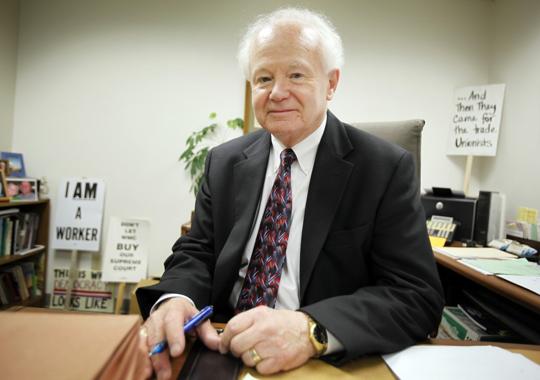Milwaukee Newspaper Investigation Shows How Act 10 Reforms Have Changed Wisconsin For the Better

Retired teacher union kingpin John Matthews fondly remembers the pre-Act 10 days when he was able to run a Milwaukee school superintendent “out of town” after she had “dared to mess with the [union hierarchy’s] choice of health insurance carrier.” But those times weren’t so happy for Wisconsin taxpayers or rank-and-file teachers. Image: M.P. King/State Journal (Madison, Wis.)
Most important of all, Act 10 rescinded the statutory power of teacher and many other government-sector union bosses to get public servants fired for refusal to pay forced “agency” fees to a union they would never voluntarily join. Thanks to Act 10, combined with the state Right to Work law Wisconsin adopted in March 2015, the vast majority of front-line employees in the Badger State may no longer be compelled to bankroll an unwanted union.
(Unfortunately, the forced-fee repeal in Act 10 exempted public-safety and public-transportation union bosses, and these sectors continue to be islands of compulsory unionism in Wisconsin even today.)
Other key provisions in Act 10 permanently stripped most government union bosses of the monopoly power to negotiate benefits and work rules for employees who don’t want a union and choose not to join as well as for union members. Still other portions of Act 10 directed public agencies to divert a significantly higher share of employees’ wages and salaries into their pension and health-care plans, and thus reduced taxpayers’ total compensation liabilities.
Early this year, an analysis prepared and published by the MacIver Institute, a pro-free market think tank based in Madison, Wisc., estimated that Act 10 had saved state and local taxpayers a total of $5.24 billion since it took effect.
Besides helping balance the state budget while making possible $2 billion in direct relief for Wisconsin taxpayers, Act 10 has actually enhanced the ability of public employers to recruit and reward good employees. School districts, for example, no longer have to waste millions of dollars buying overpriced health insurance from a teacher union subsidiary, because they no longer need teacher union bosses’ acquiescence to change their insurance providers.
Teachers can thus get better health insurance at a lower cost, and the savings can be used for better purposes, such as rewarding good teachers or reducing taxes.
In a lengthy special report on “Act 10 at five” published late last month (see the link below to read the whole thing) David Umhoefer of the Milwaukee Journal-Sentinel quoted liberally from union bosses and former union bosses who bemoan how Big Labor’s special privileges are now fewer in number and less sweeping in nature than they used to be.
For example, John Matthews, formerly the chief of Madison Teachers Inc., a subsidiary of the massive National Education Association union, reminisced to Umhoefer about how he and his cohorts were able to run a school superintendent “out of town” in the 1990s after she disagreed with Big Labor and “dared to mess” with the union hierarchy’s choice of health insurance carrier.
But Umhoefer also acknowledged that Act 10 has resulted in many changes that benefit conscientious and talented teachers, schoolchildren, parents and taxpayers:
[T]eachers have more freedom of movement and in-demand educators can get healthy bonuses or raises . . . . School spending has slowed, as has property tax growth for schools.
More school administrators are laying off teachers based on performance rather than longevity, conducting stricter evaluations, lengthening the workday and tightening up on discipline.
Moreover, Umhoefer found that by making union membership voluntary for most public employees, Act 10 has forced union officials to do a better job of advancing the interests of the employees they purport to represent:
After Act 10’s passage, the 4,500 member [NEA union subsidiary in Milwaukee] took a hard look at the local’s work and found that 85% of its time went toward litgating disputes and misconduct cases involving 2% of its members.
To broaden the union’s appeal to potential members, especially younger teachers, [union officials] shifted to working with the district on improved classroom practices, new student discipline techniques and culturally responsive teaching.
“We went back to actually caring about the profession as the main goal of our union,†said [Kim] Schroeder, the current president. “Nobody enters teaching to become a union member. You do it to become a great teacher.â€

